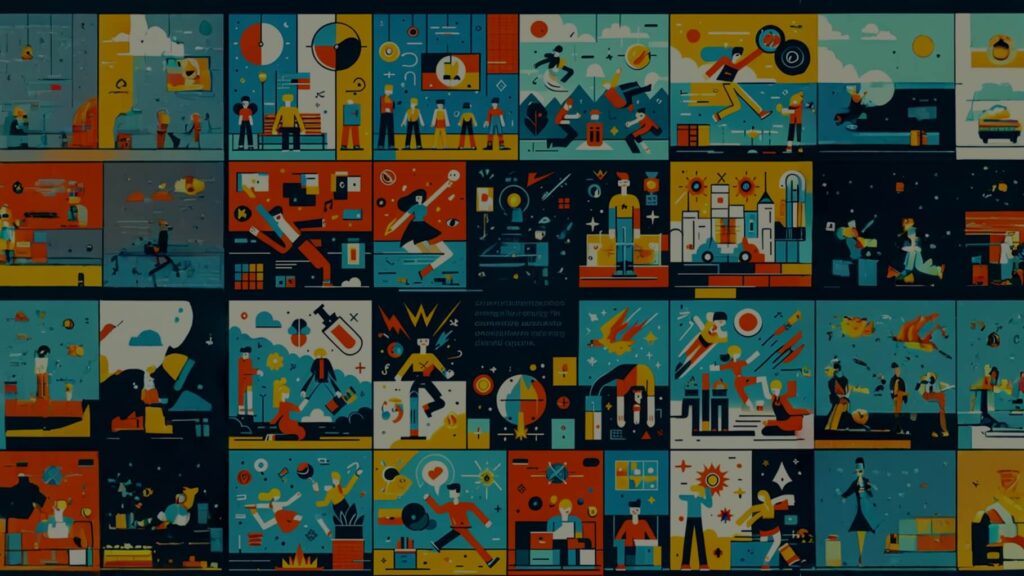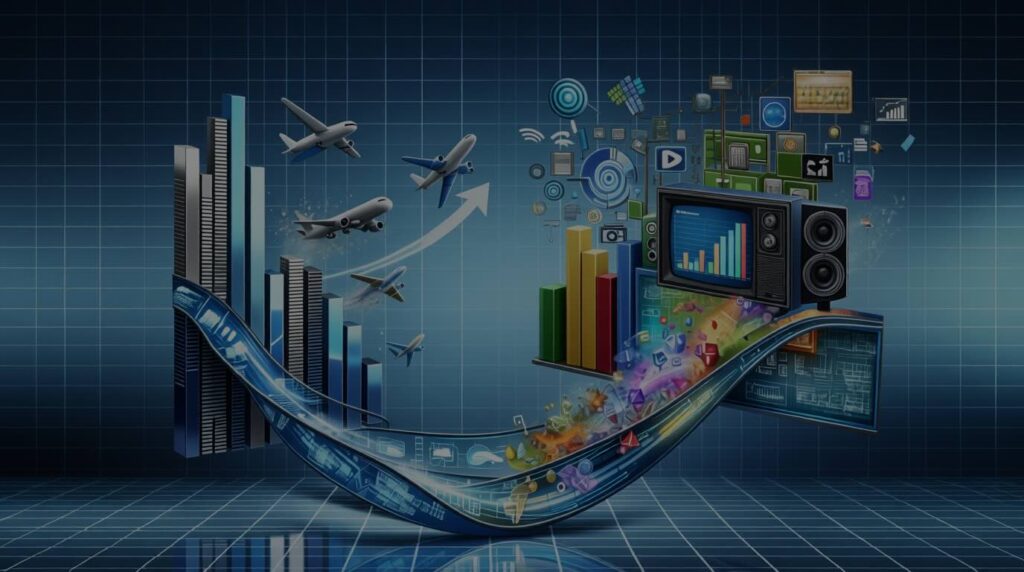Introduction
In the world of digital marketing, explainer videos have established themselves as powerful tools for communicating complex ideas with clarity and impact. So it’s only natural that you ask “What are the different styles of explainer videos?”
Here’s the deal: not all explainer videos are created equal—or created alike. The style you choose fundamentally shapes how your message resonates with viewers and influences everything from budget considerations to brand perception.
Let’s explore the rich tapestry of explainer video styles available to modern marketers, each with its own unique strengths, aesthetic qualities, and ideal use cases.
2D Animation Explainer Videos
Classic Motion Graphics
The workhorse of the explainer video world, 2D motion graphics combine simple vector illustrations with kinetic typography and smooth transitions. These videos excel at breaking down complex processes into digestible, visually engaging sequences.
Best for: Abstract concepts, data visualization, software demonstrations
Notable characteristics: Clean design, high information density, scalable graphics
Example industries: SaaS, fintech, healthcare technologies
Here’s a recent motion graphics production for StaffBot Flex— the all-in-one solution transforming how clinical teams operate in today’s gig economy.
Character-Based Animation
These videos feature illustrated characters who embody the target audience, experiencing problems and discovering solutions. This style humanizes abstract concepts and creates emotional resonance.
Best for: Building emotional connections, showing transformation journeys
Notable characteristics: Relatable scenarios, emotional storytelling, character development
Example industries: Consumer products, educational services, HR solutions.
This Gisteo production for Alzheimer’s awareness features a mother-father duo while depicting the emotional, difficult journey that is Alzheimer’s disease:
Kinetic Typography
Focusing primarily on animated text, these videos transform words into visual experiences. When words become the hero, the message often lands with greater impact.
Best for: Quote-heavy content, manifestos, powerful messaging
Notable characteristics: Dynamic text animation, minimal supporting visuals, emphasis on written message
Example industries: Publishing, thought leadership campaigns, corporate vision statements
Here’s a recent Gisteo kinetic typography production for Valify, a purchased services provider:
3D Animation Explainer Videos
Realistic 3D Animation
Creating lifelike representations of products, environments, or processes, this style offers unparalleled detail and dimensionality.
Best for: Product demonstrations, architectural visualizations, scientific explanations
Notable characteristics: Photorealistic rendering, spatial accuracy, detailed textures
Example industries: Manufacturing, medical devices, real estate
Below, is an example of a Gisteo production for Hunter, demonstrating the company’s wheel alignment solution:
Stylized 3D Animation
Combining the dimensional advantages of 3D with artistic stylization, these videos create unique visual worlds that balance realism with brand aesthetics.
Best for: Creating memorable brand universes, standing out from competitors
Notable characteristics: Distinctive art direction, brand-aligned aesthetics, dimensional depth
Example industries: Gaming, entertainment, innovative consumer products
Gisteo produced this educational, stylized 3D explainer on NFTs for WAX:
3D Product Animation
Focusing exclusively on the product, these videos showcase features, components, and functionality with precision and clarity.
Best for: Complex physical products, internal mechanisms, assembly instructions
Notable characteristics: Cross-sections, exploded views, rotational perspectives
Example industries: Consumer electronics, automotive, industrial equipment
Gisteo did just this with a 3D BEKO product demo video:
Whiteboard Animation
Traditional Whiteboard
Featuring a hand drawing illustrations in real-time on a white background, this style creates an intimate, educational feeling reminiscent of classroom learning.
Best for: Educational content, step-by-step processes, budget-conscious projects
Notable characteristics: Continuous drawing, visible hand, black and white with selective color
Example industries: Education, training programs, non-profits
RSA popularized this style in their explanatory whiteboard video series, such as this one:
Digital Whiteboard
A modern evolution of traditional whiteboard animation, incorporating color, textures, and digital effects while maintaining the drawing-based narrative approach.
Best for: Combining educational clarity with brand aesthetics
Notable characteristics: Color palettes aligned with brand, smoother animations, no physical hand
Example industries: Professional services, consulting, HR communications.
Gisteo whiteboard explainer for Blue Dot Seats in a great example of a modern digital whiteboard:
Stop Motion Animation
Object Stop Motion
Using physical objects that are incrementally moved and photographed, this style creates a distinctive, tangible quality that digital animation cannot replicate.
Best for: Product-centered videos, tactile experiences, standing out in digital feeds
Notable characteristics: Textural quality, distinctive movement patterns, authentic imperfections
Example industries: Artisanal products, food and beverage, sustainable goods.
Here’s a good explanation of what the stop motion technique is all about:
Paper Cutout
Utilizing paper elements to create movement and visual interest, this style brings warmth and a handcrafted feel to explanations.
Best for: Approachable explanations, environmentally conscious brands
Notable characteristics: Textured paper, shadows and dimension, tactile transitions
Example industries: Sustainable products, children’s services, community initiatives
This vintage style was in vogue a decade ago, when Gisteo produced this cut out whiteboard explainer for Password Box:
Live Action Styles
Documentary-Style
Featuring real people in real environments, these videos ground explanations in authentic human experiences, often combining interviews with supporting visuals.
Best for: Testimonial-heavy content, community-focused organizations, emotional stories
Notable characteristics: Interview footage, environmental b-roll, journalistic approach
Example industries: Healthcare, education, social impact organizations
Gisteo produced this interview-driven live action production for Airbus a few years back:
Presenter-Led
Centered around a charismatic presenter who guides viewers through the explanation, creating a personal connection with the audience.
Best for: Personality-driven brands, thought leadership, complex topics requiring human warmth
Notable characteristics: Direct address to camera, personality showcase, scripted delivery
Example industries: Coaching services, personal brands, educational platforms
Gisteo’s own explainer live-action video exemplifies this particular style. It has been a very effective asset for our company over the past couple of years:
Screen Recording
Capturing on-screen activity with narration, these videos show exactly how digital products work in real-world situations.
Best for: Software tutorials, user experience demonstrations, digital product onboarding
Notable characteristics: Cursor movements, UI focus, step-by-step instructions
Example industries: SaaS, apps, digital platforms
At Gisteo, we’ve done a number of these types of tutorial videos over the years, such as this example for Frequence, a programmatic ad platform:
Hybrid Approaches
Live Action with Graphic Overlays
Combining real footage with animated elements, this approach grounds abstract concepts in reality while using graphics to highlight key points.
Best for: Technical explanations requiring real-world context
Notable characteristics: Dimensional graphic overlays, integrated data visualization, enhanced reality
Example industries: Industrial solutions, medical procedures, technical equipment
This type of production is growing in popularity, something we called “Mixed Media” at Gisteo. Here’s just one of many examples that we’ve produced in the mixed media style, this one for SmartPin:
Animated Infographics with Live Elements
Primarily animation-based but incorporating live action elements for emphasis or emotional connection.
Best for: Data-heavy content that benefits from human connection
Notable characteristics: Chart animations, statistic visualizations with human contexts
Example industries: Research organizations, financial services, healthcare analytics
Gisteo used this style to bring to life a segmentation study report for Strategence:
Tips on Choosing the Right Style
When selecting an explainer video style, consider:
-
Your audience’s visual preferences: Different demographics respond differently to various visual styles.
-
Content complexity: Some styles better support intricate explanations than others.
-
Brand alignment: Your video style should be an extension of your overall brand aesthetic.
-
Budget considerations: Animation styles vary significantly in production costs.
-
Distribution channels: Where your video will appear influences optimal style choices.

The Evolution of Styles
Explainer video styles continue to evolve with technological advancements and shifting aesthetic preferences. Emerging trends include:
-
Isometric animation: Creating depth while maintaining a distinctive graphic style
-
Liquid animation: Fluid transitions and morphing elements that create seamless narratives
-
Augmented reality integration: Blending explainer content with real-world environments
-
AI-generated visuals: Using artificial intelligence to create unique visual assets

Finding Your Signature Style
The most successful brands develop a consistent visual language across their explainer videos, creating recognition even before their logo appears. This doesn’t mean limiting yourself to a single style—rather, it means identifying visual elements that can translate across different approaches while maintaining brand coherence.
When a viewer says, “That looks like a [Your Brand] video,” you’ve achieved something powerful: visual ownership in a crowded content landscape.

Why Choose Gisteo for Your Explainer Videos?
At Gisteo, we’ve been crafting explainer videos since 2011, producing over 3,000 videos across various industries. Our experience ensures that we understand the nuances of different styles and how to tailor them to your brand’s needs.
Unlimited Yearly Plan
For businesses requiring multiple videos, our Unlimited Yearly Plan offers flexibility and cost-effectiveness. This plan allows you to produce as many videos as needed throughout the year, ensuring consistency and timely delivery for all your projects.
AI Avatar Videos
Embracing cutting-edge technology, Gisteo offers AI avatar videos. These videos utilize advanced AI to create realistic avatars, providing a unique and engaging way to present your message. This innovative approach is perfect for brands looking to stand out and connect with their audience in a modern, dynamic way.
Conclusion: Choosing the Right Explainer Video Style
Understanding what are the different styles of explainer videos is crucial for effectively conveying your message. Each style, from 2D animations to AI-generated avatars, offers unique advantages tailored to specific content and audience preferences.
At Gisteo, we specialize in helping you navigate these options to find the perfect fit for your brand. Whether you’re interested in traditional animations or exploring innovative AI-driven videos, our team is equipped to deliver high-quality content that resonates with your audience.
Explore our diverse portfolio and discover how our expertise can bring your ideas to life. Contact us or schedule a free consultation to learn more and start your journey toward compelling visual storytelling.




